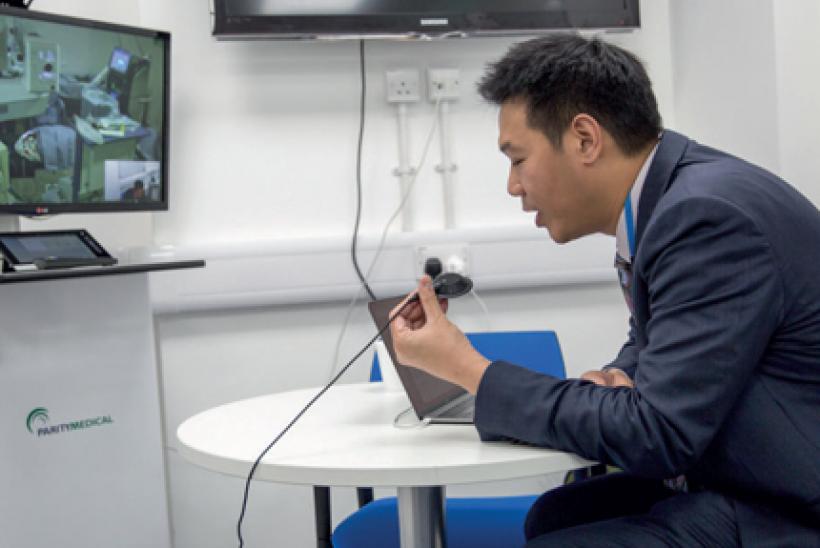Groundbreaking telesurgery hosted by Great Ormond Street Hospital for Children
Great Ormond Street Hospital for Children (GOSH) in London, one of the world’s leading paediatric hospitals, recently hosted groundbreaking telesurgery performed by Mr Chien Wong.
When the Armenian EyeCare Project, a Californian NGO that has transformed ophthalmic care in Armenia since 1992, recently contacted Mr Wong about an urgent case of retinal detachment in a premature baby, Mr Wong was faced with a dilemma. “There was a baby that had a rapidly progressive retinal detachment and I couldn’t fly out on such short notice. If the child had waited for me to go to Armenia, the opportunity to salvage vision would have been missed and the baby would have had irreversible blindness.” Mr Wong explained. Instead, working with the ICT team at GOSH, Mr Wong was able to supervise the surgeons in Armenia using telesurgery.
“It is really quite remarkable that we are able to support a programme like that from afar.” Mr Wong commented on the telesurgery where he supervised surgery in real-time taking place over 3,500km away in Armenia. As part of the Armenian EyeCare Project, Mr Chien Wong, in collaboration with his colleague Dr Thomas Lee from the Children’s Hospital in Los Angeles, has been training two highly experienced Armenian retina specialist consultants to perform complex vitreoretinal surgery on babies with retinopathy of prematurity (ROP) and other potentially blinding retinal diseases. Since the launch of this national ophthalmic treatment centre in Armenia in 2014, Mr Wong has led and been training the surgical team on-the-ground, travelling to Armenia every three months.
Through the teleconference system at GOSH, Mr Wong was able to remotely supervise the surgeons via telesurgery. Mr Wong was given a bird’s eye view of the operating theatre, as well as seeing a live instantaneous video feed that mirrored the Armenian surgeons’ view of the operation. At the same time, the surgeons in Armenia were able to see a live image of Mr Wong and talk to him as they went through the surgery. The surgery took three hours and Mr Wong was able to oversee the entire surgery in actual time. “It went very well indeed. It was a highly complex operation, which has given the child the possibility of regaining useful sight, whereas without surgery visual loss was certain.” Mr Wong explained.
The telesurgery was a ground-breaking moment for the EyeCare Project, as the Armenian surgeons had never performed surgery without an expert assisting them on-site. “It was a critical landmark moment in the history of the project and it was paramount for the child that they were able to receive essentially first-world cutting-edge surgical treatment for a rare condition in Armenia.” The telesurgery was also a first for GOSH and was made possible by both hospital’s ICT teams and the state-of-the art technology available. Mr Wong praised the hard work of the ICT team for helping to set up the telesurgical link-up. “The set up worked very well with zero time lag and high definition resolution. ICT were fantastic at helping coordinate the entire set up within a very narrow time frame. A world class UK hospital truly at its best.”
Mr. Wong is a consultant at Great Ormond Street Hospital, Moorfields Eye Hospital and the Royal Free Hospital and is a world expert in paediatric vitreoretinal surgery, endoscopic vitrectomy in babies and young children, and paediatric retinovascular diseases. He also manages adults with vitreoretinal diseaess. He is one of only two surgeons in the world with significant expertise in a new surgical technique for the treatment of ROP, called endoscopic vitrectomy, and introduced this technique to GOSH in 2014, making GOSH one of only two hospitals in the world that can perform this sight-saving technique.
GOSH was the first hospital in the UK to establish paediatric ophthalmology as a subspecialty, recognising that disorders affecting children’s eyes are frequently very different to those affecting adults. The ophthalmology department at GOSH treats a wide range of ophthalmic problems including glaucoma, cataracts and neuro-ophthalmologic problems and is one of the only hospitals in the country that can perform corneal graft surgery.

